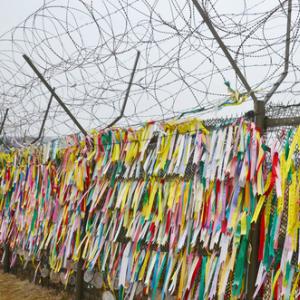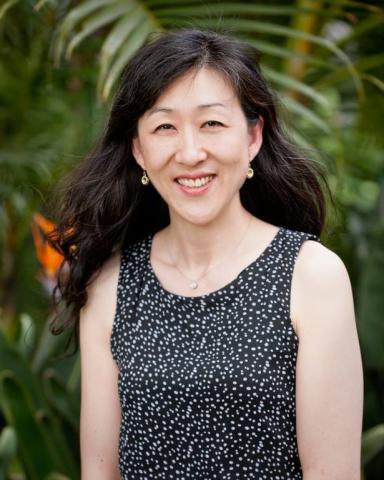
Rev. Dr. Grace Ji-Sun Kim is an associate professor of theology at Earlham School of Religion. Grace Ji-Sun Kim obtained her M.Div. from Knox College and her Ph.D. from the University of Toronto. She is the author of 18 books, including Reimagining Spirit and Embracing the Other: The Transformative Spirit of Love. You can find more of her writing HERE or at the Huffington Post blog. She is ordained as a minister in the Presbyterian Church (USA).
Posts By This Author
When Church Fosters Both Belonging and Bigotry
Attending church was the beginning of my faith journey, when I began to understand myself, the world, and God. The racism, discrimination, and xenophobia embedded into my daily life were normalized, swiftly decreasing my self-worth as well the worth of other Korean, Chinese, and Vietnamese kids I grew up with. Helplessly, we tried to see ourselves reflected, but especially in each other, we found only mere echoes of insecurity.
Peace on the Korean Peninsula Is Still Possible
Today, the space to negotiate peace on the peninsula remains accessible as both Koreas and the United States are not only aiming for peace and denuclearization, but on genuine economic cooperation.
How to Hope When the World Is Burning
How do we maintain hope when our earth is brutalized daily by the climate disasters brought on by human greed, denial, and consumption?
They’ll Know We Are Christians by Our ‘Jeong’
I GREW UP IN LONDON, Ontario, a small city west of Toronto. As an immigrant, my dad wanted to make sure that his daughters grew up with an accurate understanding of Western culture, so he acculturated us to this strangely foreign world by taking us to non-Korean church services throughout the week. After our regular Korean Presbyterian Church’s Sunday service, he took us to a Sunday night Baptist service, a Wednesday night Baptist service, and a Friday night Missionary Alliance Bible study and youth group. Church also served as a free source of English lessons for me and my sister.
My parents loved to go into Toronto and Detroit to attend revival services. These revivals were out-of-this-world experiences, and at times they frightened me. I saw things that I had never seen in any other church visits, and it was during these services that I first witnessed the effects of the Holy Spirit.
My early experiences of the revivals involved adults gathered in the sanctuary for hours, and the only hint as to what they were doing was the eerie muffled sounds of their yelling, laughing, shouting, screaming, and crying. One day, as I tell in my 2018 book The Homebrewed Christianity Guide to the Holy Spirit, my curiosity got the better of me. I naively peeked inside the room. What I saw was a jarring scene of the adults in frenzied states of devotion. Some threw their arms up, with tears streaming down their faces, praying and crying out to God. Some people lay on the floor weeping and shaking uncontrollably. I saw my mother, illuminated in the yellow sanctuary light—she stood upright with her hands high above her head, eyes closed and tears rolling down her face as she spoke in tongues.
This was my earliest encounter with the fruits of the Holy Spirit. Due to the inconsistencies of what I saw and my fear, I didn’t do much to explore the Spirit for much of my life, until I started teaching theology and encountering people of various backgrounds, ethnicities, and religions. As I listened to them, I reflected on my own background—my Asian culture, religion, and heritage. I believe that knowing one’s own culture and heritage is imperative to understand the religious landscape in a globalizing world where cultures clash, immigrants come together, and refugees seek new homes away from home.
Asians comprise 60 percent of the world’s population. Major world religions such as Hinduism, Confucianism, Taoism, Buddhism, Jainism, Christianity, and Sikhism were born in Asia. But Christianity soon became Eurocentric, influenced by Greco-Roman philosophy. Today, as Christians grapple with faith in a globalizing world, it may be helpful to see if Asian culture can bring some insights into the Western Eurocentric portrayal of the Holy Spirit.
People who speak multiple languages can attest to how different languages give deeper insight to our concepts and experiences. The five Asian words and concepts that follow can help us enrich and reimagine the Western understanding of the Holy Spirit.
Removing the Burden of Shame: Sexual Assault in Asian-American Communities
Now as a mother of a young adult and two teenagers, I believe it is important to share my story so that society is aware that sexual assault occurs frequently, even in Asian American communities. Just because we do not share our experiences publicly does not mean that Asian Americans are immune to sexual violence. Just because we carry the burden for decades doesn’t make our experiences untrue. Just because we do not share our stories doesn’t mean that we need to continue to live in shame.
Why I Vote
A Deeply Moral Act
Voting is a decisive statement of Christian faith that I matter, justice matters, and others matter.
by Richard Rohr
Low voter turnout is generally a sign of a demoralized society, and people of power feed on that demoralization, knowing that they can then easily gerrymander, suppress and limit voting rights, and give elections to the rule of money and lobbyists—and there will be little outcry, because there is so little trust or even interest in the whole system anyway.
Yet this is largely where the U.S. is today.
The powers that control society are quite happy that it is always minorities of all stripes that first feel this powerlessness and this demoralization. Since the early days of representative government, it has been believed that democracy would only work if there was a truly free and informed citizenry. We presently seem to lack both in the U.S. This is why voting is a deeply moral act for me—in rebuilding confidence and encouraging an intelligent and hope-filled society. It is also a decisive act of Christian faith that I matter, society matters, justice matters, and others matter.
Not to vote is to hand our power and our dignity over to people who fear actual freedom, honest intelligence, and faith in the very goodness of humanity.
Voting for Change
I vote because many of my brothers and sisters can’t.
by Myrna Pérez
I vote for a lot of reasons. I love joining my fellow citizens in a community-minded act. I love having a say in picking the leaders who get to decide on things that matter to me. Increasingly, I love to vote and feel compelled to vote because I know there are about 4.5 million Americans living and working in communities across the country who cannot because they have a criminal conviction in their past.
Peace in Korea Requires Diplomacy, Not Provocation
The historic meeting was set for June 12 in Singapore, but was cancelled by Trump this month. The U.S. approach to this meeting was concerning. Trump felt that the U.S. did not have to do anything to prepare for the June meeting. He continues to keep a military presence in South Korea with joint U.S. and South Korean military exercises that have always been a threat and irritation to North Korea. The mere presence of 25,000 U.S. Troops in South Korea heightens the suspicions and anxieties of Kim Jong un and the North Korean people. Trump has become blind to the need for diplomacy.
‘Koreans Live in Hope:’ What the Summit Could Mean for Reunification
Even though many view this summit with cynicism, it is an important step towards any possibility of peace on the Korean peninsula. The summit was historic because Kim Jong-un and Moon Jae-in met for the first time and agreed to end the Korean War. They also agreed on the Panmunjom declaration which seeks a denuclearization of the peninsula. Russia, China and Japan have also welcomed the agreement.
A Green Reformation
FIVE HUNDRED YEARS after Martin Luther’s charge semper reformanda (“always reforming”), we stand on the precipice of climate disaster.
In Marrakesh, Morocco, people of faith met at the 2016 U.N. Climate Change conference (COP22) to face an impending climate disaster—a disaster that now seems likely to be exacerbated by U.S. political leadership rather than mitigated by it.
The World Council of Churches held an event in Marrakesh to emphasize how transitional justice- and rights-based approaches, alongside faith-based moral perspectives, can address challenges as complex as natural-resource management and ecological, humanitarian, and spiritual crises exacerbated by climate change. WCC organizer Henrik Grape hoped that “COP22 will take steps forward to fulfill the expectations from Paris and that nations will raise their ambitions to keep the temperature [rise] well under 2 degrees Celsius.”
A wide variety of church bodies were represented at the gathering. The Lutheran World Federation brought youth delegates from Africa to Marrakesh to promote intergenerational collaboration and solidarity with people most affected by climate change. “One of our thematic approaches to the commemoration of 500 years of Lutheran Reformation is the theme ‘Creation: Not For Sale,’” said Caroline Bader, youth secretary for the federation. The Act Alliance, a coalition of 143 churches and parachurch organizations, established a gender-climate change working group to address sustainability among poor and marginalized people through a gender lens.
Catholic theologian Guillermo Kerber believes that Pope Francis’ encyclical on the environment is a turning point for the social doctrine of the Catholic Church, by including ecology in the social concerns of Catholics. “The celebration of the 500 years of the Reformation should be an opportunity to express an ecological conversion of all Christian denominations,” said Kerber.
What the Church Can Learn from NBC’s Offensive Korea Comments
The colonial narrative that colonizers sometimes improve the lives of colonial subjects is false and is used as a propaganda tool by those who seek to justify continued invasion and colonization of the world through imperialism.
We'll Always Have Paris (But Is That Enough?)
I LANDED IN Paris on Dec. 3, barely three weeks after the mass murder there of 128 people by armed extremists. On these same streets now gathered thousands from around the world—including from across the faith world—to hammer out an international agreement on climate change.
After checking in to my hotel, I made my way to the grand Notre Dame Cathedral for the ecumenical worship service organized by the Council of Christian Churches in France. While still blocks from the church, I began to hear the boisterous ringing of bells. Such joyous clanging from Notre Dame reminded the whole world that peace and hope were still possible, both on the earth and with the earth.
And the Climate Change Conference in Paris—COP 21, as it’s known—offered a needed opportunity to take a key step toward peace with the earth. The window to avoid total climate disruption is closing faster than many of us imagined possible.
I stepped into Notre Dame with awe—and an awareness that this kind of work requires prayer and miracles. Never in my wildest dreams did I think I would worship in such a magnificent and historic place. The church was nearly full. I sat near the back. Voices from the choirs rang through the massive stone sanctuary. On such a cold evening, their beauty touched and warmed us with poetry and power. The worldwide church was in attendance, dramatically offering its gifts back to the Creator.
‘Leaders can’t afford to come home empty-handed’
Before COP 21, Bill McKibben—an environmental activist, author, and Methodist (and Sojourners columnist)—observed, “Paris isn’t the game, it’s the scoreboard. It shows us how much we’ve done—and haven’t done—over the years since Copenhagen (COP 15 in 2009), when we suffered a huge defeat. There is a big enough movement now—in no small part thanks to faith communities, patriarchs, popes, and the like—that we’ll see some progress in Paris. World leaders can’t afford to come home empty-handed.”
He was right. People of faith came to Paris from every corner of the earth. Some came as negotiators and political delegates, some as observers, and others as prophetic voices to hold political leaders accountable to the science and the moral imperative of safeguarding a living planet.
As a consequence of the November terrorist attacks, public marches for climate justice—which had been expected to draw more than 200,000 people—were cancelled by French authorities. In lieu of the marches, French activists called for a “global march” in solidarity with them. At the end of November, hundreds of thousands around the world took to the streets to make clear to the leaders headed to Paris that the whole world was watching. More than 570,000 people marched in 2,300 events in 175 countries, according to organizers, making it the biggest set of global climate change marches in history. “The charge from the streets for leaders to act on climate has been deafening, with record numbers turning out across the world,” said Emma Ruby-Sachs, campaign director for Avaaz, a global civic movement.
Religious Leaders at COP21 Issue Urgent Plea for Care of Creation

Image via Balazs Kovacs Images/Shutterstock.com
At COP21 last week, religious leaders participated in a “Fast for Climate” and delivered petitions with more than 1.7 million signatures to Christiana Figueres, executive secretary of the UN Framework Convention on Climate Change, demanding immediate climate action.
These leaders, from different faith traditions, also held a press conference at COP21 with the message that they are united in the fight against climate change.
COP21 is not only a gathering of world leaders to achieve an agreement on climate change — it is a gathering for all concerned with the issue. This has included religious leaders from many of the world’s faiths and denominations, who realize a responsibility to speak out on grave societal illnesses and care for the world.
One of the most intriguing and lifegiving events at COP21 was an ecumenical worship service held at the Notre Dame Cathedral on Dec. 3, organized by the Council of Christian Churches in France.
COP21 Is Coming. What Will World Leaders Talk About?

Image via Chepko Danil Vitalevich/Shutterstock.com
"The biggest open question in Paris may be how much aid goes to poor countries trying to leapfrog fossil fuels,” Bill McKibben, Schumann Distinguished Scholar at Middlebury College and founder of 350.org, said.
“For reasons both moral and practical the number should be large — larger than it likely will be."
As we think about the future of our children and our grandchildren, we need to rethink our use of water: how we store it, how we carry it and how we drink it. Water is a human necessity. Our ignorance can lead to the irony of spoiling watersheds — by robbing them of potable water while introducing mountains of plastic waste, impervious to decays which produce useful soils, and diverting water from useful work.
Strangers in a Strange Land
MY FAMILY EMIGRATED from South Korea to Canada in 1975 when my sister and I were 6 and 5 years old, respectively. Before I left Korea, I had no idea where Canada was. With our mother, we boarded a plane that took us to Hawaii, then Alaska, and finally Toronto.
Korean was the only language I had ever spoken. I assumed that everyone spoke Korean. I had no idea what people were saying when I arrived in Toronto. My uncle in Korea gave my sister and me each a cute little necklace to wear with our name, address, and phone number written on the back of it. It was a round red necklace with a picture of an adorable puppy. We wore it around our necks on the plane so that if we got lost, we could more easily ask for help to find our way home.
After 40 years of carrying the necklace with me as I moved from place to place, my children threw it into the garbage last year as they were doing spring cleaning. They thought it was a piece of junk. It may look like junk, but to me it provides a special reminder of my childhood, family, and the home from which I emigrated. Luckily, I liberated it from the garbage before trash day. Now I keep it safe as one of my prized possessions, one of the few things I have left from Korea and from my childhood.
My necklace reminds me from where I have come, what I have experienced, and what I have endured. As my necklace has survived all the moving and tossing around in my life, I too will survive.
As an immigrant family, we had few earthly possessions. We lived in a two-bedroom, cockroach-infested apartment. I had only one little hand-me-down toy doll that someone passed on to me rather than throwing into the trash. My library consisted of a few books that I read over and over. My parents had one car, and they worked different shifts, so they were rarely home at the same time. There was no car at home to drive us to the library to sign out books. After awhile I allowed my creativity to run wild and made up imaginary stories based on the pictures in the few books we had.
Sustainability and Care for Creation: WCC and Climate Change
About 30 global religious leaders working in their churches and organizations on environmental justice and advocacy for climate change met last month for the World Council of Church’s (WCC) Working Group on Climate Change in Wuppertal, Germany.
This group tackled the urgent issue of climate justice — as there are environmental problems caused by rich nations that affect others. This includes, for example, the great Pacific garbage vortex and depletion by U.S., Japanese, and Norwegian fishing of species, such as cod, on which smaller countries depend for sustenance, creating conditions that affect vulnerable communities around the globe. Climate change is affecting those in Africa as it dries up their land and enlarges the size of the Sahara desert. It affects Asia as huge storms flood broad areas of coastline, devastating homes and lives. Climate change is affecting the most vulnerable populations, which live near vulnerable croplands and shorelines and depend on farming and fishing for their livelihood. Climate change creates weather that takes lives and destroys communities.
Climate change workers realize that those who have contributed the least to CO2 emissions are (and will be) suffering the worst consequences.
The Church in a Media-Saturated Society
I grew up in the days of the encyclopedia salesman. I clearly remember the day when a clean-cut well-dressed man knocked on our apartment door to sell the 26-volume World Book Encyclopedia.
We were recent immigrants and could not speak English fluently. We had few worldly possessions and the last thing we needed in our house was a 26-volume encyclopedia.
After the hour presentation during which we flipped through the volumes full of exciting information, my dad said no. The salesman looked sad and pitiful as he packed his sales kit. As he exited the door, he gave one last pitch and, suddenly, my dad changed his mind and we bought the whole set.
Either the salesman was good or my parents had this strong desire that their children needed to know “everything there is to know about the world.” Maybe it was a bit of both.
In 2014, long gone are those 26-volume encyclopedias that once filled the bookshelves of many of my childhood friends’ homes. Now we have everything that we need to know at our fingertips through iPads, computers, cell phones, or other gadgets.
Kenneth Bae's 500th Day: Life’s Cycle of Fear, Pain, and Suffering
Today marks Korean-American Christian missionary Kenneth Bae’s 500th day in a North Korean prison. Bae was arrested in November 2012 while leading a tourist group. State-run media reported that he was convicted of attempting to lead a religious anti-North Korean religious coup. He has been sentenced to 15 years of hard labor. Bae is a reminder to all of us that Korea remains divided. Brothers and sisters are separated and friends are divided between the 38th parallel.
I was born in Seoul, South Korea. My mother and father were children during the Korean War, and my mother told me a few stories of how they had to flee during the war. She was a young child, one of eight. My grandmother would gather the children and walk for miles and miles making their way down into southern Korea. As they were fleeing one day, a bullet went through my grandmother’s thigh and created permanent damage to her leg. As a young child, I thought it was a wonderful war story of heroism and courage. I didn’t realize then the agony, fear, and suffering that my parents or my grandparents went through to keep safe and keep alive.
As the Korean War lingered on, it ended with the division of Korea at the 38th parallel. That division is a stark reminder of how a beautiful, lovely country can be filled with pain, sorrow, animosity, and suffering. The 38th parallel has kept family members and loved ones apart for almost 60 years. Many divided families are unable to reunite or unable to know if their relatives are still living and doing well. The heartbreak of living apart in their own country has brought lots of anger, tension, loss, and suffering.
In Korea, people have a term for such suffering: han. Han is a difficult word to translate into the English language. The best way to do so may be through ‘unjust suffering’ or ‘piercing of the heart.’
Walls That Divide
Walls exist between U.S. and Mexico. A few years ago, I took a class to the Mexico-U.S. border through BorderLinks, an organization that provides educational experiences to connect divided communities, raise awareness about border and immigration policies and their impact, and inspires people to act for social transformation. We visited the metal wall that separates the United States from Mexico at Nogales, Mexico.
The walls went up in 1994.
The North American Free Trade Agreement (NAFTA), established in 1994, was supposed to help with trade and the economic status of Mexico. However, it failed to do this. It backfired and made the economic situation worse for the people of Mexico. Rich corporations and companies that benefited from the Free Trade Agreement as they were able to move their factories down to Mexico where the labor was cheap and profits higher. As the economy of Mexico suffered, more people made their way, without documents, to the United States to seek work so they could support their families.
In 2006, the United States responded with the Secure Fence Act. As President George W. Bush signed the bill, he stated, “This bill will help protect the American people. This bill will make our borders more secure. It is an important step toward immigration reform.” The act included provisions for the construction of physical barriers — walls — and the use of technology to these ends.
This wall is under constant surveillance to prevent people from entering into the U.S. illegally. Ironically, it is a wall built from the remaining metal landing scraps of the Gulf War. The border is highly militarized with patrols who treat migrants as “prisoners of war.” It symbolizes militarization, greed, xenophobia, hatred, pride, nonsense, and fear of the other, a reminder of wanting to protect what is yours and not sharing what God has given you. Walls continue to go up along the border as the people of the United States continue to fear that undocumented people will take away jobs. These fears may devastate the lives of the poor in both countries.







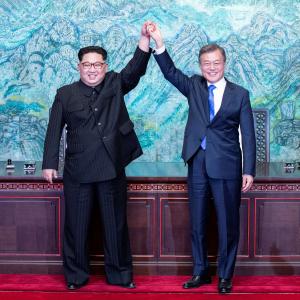


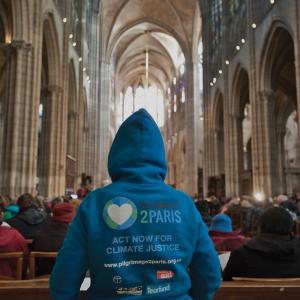
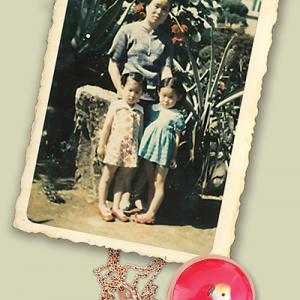


![By U.S. Department of State from United States [Public domain], via Wikimedia Commons By U.S. Department of State from U.S., via Wikimedia Commons](https://sojo.net/sites/default/files/styles/large_square/public/blog/Secretary_Kerry_Meets_With_the_Family_of_Kenneth_Bae_%2812194118966%29%20%281%29.jpg?itok=QRZ2Dp_3)
